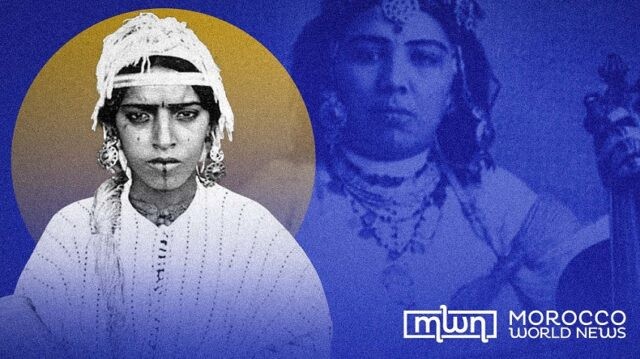
Kharboucha: Moroccan Heroine, Voice of Rebellion Against Injustice
Kharboucha is undoubtedly one of the first significant characters in Morocco’s history. A woman who dared, who sang about love, who denounced political injustice and colonialism; a woman with weapons and music.
For the Moroccan people, above all, Kharboucha will remain renowned for her bravery and political wisdom.
In the late 19th century, poverty and famine were pervasive in Morocco as a result of the financial crisis that the country experienced at the time. This crisis set the stage for a subsequent colonial invasion and oppression.
There were, however, numerous uprising rebellions, including the rebellion of the tribe “Oulad Zeid.”
Born in Morocco in the late 1800s in the region of Doukkala-Abda near Safi, Kharboucha was a member of this tribe.
Kharboucha, who was also known as Hadda Al-Ghita, her real name, was an iconic figure and a political activist who used her voice and poems to fight the brutality and injustice of caid Aissa Ben Omar.
One of the most prominent leaders in the history of Morocco is Aissa Ben Omar, who was born in Safi in 1842. He became the head of the Abda region during the reign of Sultan Abdul Aziz.
Ben Omar was famous for his brutality and cruelty, as his forces savagely subdued the uprising of the Oulad Zeid tribe in mid-1895. Historians know this oppression as the year of “Refsa,” which can translate to the year of “kick” in English.
Kharboucha, who could not stand the injustice the powerful caid imposed, decided to instill into her tribe the spirit of rebellion so as to stand up against his regime’s wrongs. She used her voice as guidance in this conflict against Aissa Ben Omar.
Inspiring Morocco’s aita genre
The genre of music Kharboucha used is “aita,” which translates to “cry.”
The aita is a Moroccan rural genre of song with lyrics originating from Moroccan Arabic (Darija).
Aita can be performed by a single person or a group of musicians, with strong vocals.
Kharboucha was one of the pioneers of aita through her songs that depict Moroccan women’s lives, anti-colonial resistance, a clear sense of freedom, and an urgent desire for political rights within their communities.
In her songs, Kharboucha provoked Aissa Ben Omar, whose name alone struck terror in people’s hearts. Lyrics made him the object of ridicule in Abda and neighboring areas since her poetry and songs spread like wildfire among members of her tribe and other neighboring tribes.
Kharboucha produced many songs during her short lifetime that tell the story of her fight against colonialism and the caid Aissa Ben Omar. Kharboucha told the caid in one of her songs that she would never surrender to his tyranny, and that she would never cease to defend her people and her homeland, as well as accusing the caid of burning Ouald Zeid’s lands and killing her relatives.
Kharboucha’s ambiguous end
Kharboucha’s demise remains shrouded in some level of mystery. There are many different stories that try to tell her tale after Aissa Ben Omar captured her.
Some of the narratives claim that Ben Omar imprisoned her in a house before setting it on fire. Other stories state that after her imprisonment, her tongue was cut off under the chief’s vindictive orders as a means for mending his broken pride.
Another version alleges that men of power captured her and her boyfriend during their escape. Out of mercy, however, they sent them away from the chief and his despotic tyranny to Rabat, but the eyes of the chief spotted her on her way to the sultan before he abducted and killed her.
Kharboucha: Morocco’s first sheikha, an inspiration to artists
Kharboucha’s name means “sheikha.” Sheikhat are traditional folk entertainers who perform a specific type of dance and sing their poems on occasions such as wedding ceremonies, Aqeeqah (the celebration of a child’s birth), and soirees.
Because of divorce, widowhood, or neglect, society views sheikhat as free women. Being without any man by their side, they care for their children by themselves. They come from a common village center, but sometimes they become a victim in the city.
Many people scorn and discriminate against sheikhat due to a sexual stigma, but the story of their namesake — a strong and heroic woman — can serve as a remedy to those stereotypes.
Kharboucha is a character who inspired generations of writers and filmmakers.
One of those is the filmmaker Hamid Zoughi, who released a film retracing Kharboucha’s history titled “Kharboucha.”
Her story also inspired the playwright Abderrazak Badaoui to stage his play “Milouda Bent Driss,” which translates to Milouda the Daughter of Driss.
In 2002, the tale of Kharboucha also inspired Farida Bourqia to write the script for the film “Jnane El Kerma,” which translates to the Garden of the Grapes.
At the same time, playwright Salem Gouindi also wrote a piece for the regional theater company of El Jadida titled “Kharboucha.”
